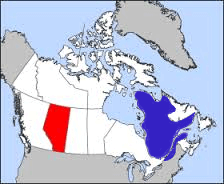Over the weekend, former Wildrose leader Brian Jean called for fellow Albertans to join him in an all-out boycott of Quebec products.
The occasion was prompted by a comment from François Legault, the new right-leaning premier of Quebec. At a Montreal premiers’ meeting, Legault shot down any hope for a revival of the Energy East pipeline saying “there’s no social acceptability (for oil) in Quebec.”
Albertans are correct that Quebec has penchant to disparage Athabasca oil while simultaneously fuelling their cars with petroleum from some of the worst regimes on earth. They are also correct that Quebec disproportionately benefits from federal treasuries flush with Alberta oil money. These frustrations aside, a boycott may not be the wisest way to show Quebec the error of its ways.
Below, a quick primer on how an all-out boycott between Canada’s most temperamental provinces could expect to play out.
Quebec buys an awful lot of stuff from Alberta
According to 2015 figures, Albertans spent $8.9 billion on goods and services produced by Quebec. Quebec, in turn, spent $6.2 billion on goods and services from Alberta. This works out to a trade deficit of $2.7 billion, but it still means that up to two per cent of Alberta’s GDP exists thanks to Quebec money. Quebec’s largest single purchase of Alberta goods in 2015 (the last year for which data is available) was the $840.7 million they spent on natural gas products. Quebecers fly WestJet a lot, which accounts in large part for the $142 million they spent on Albertan air transportation (Albertans, by contrast, spent $193.5 million flying Quebec-based airlines such as Air Canada). Quebec also seems to enjoy Alberta’s plastics and industrial gases, buying more than $100 million of them per year. The point is, if Alberta wants to throw down with La Belle Province, Quebec can do a lot more damage than simply stonewalling a pipeline.

Insurance and banking services are, by far, the number one Quebec product purchased by Albertans
After the Fort McMurray wildfires, one of the first people allowed into the stricken city were teams of Quebec insurance claims processors dispatched to calculate how many cars and houses they would need to replace. In 2015, Alberta spent $266 million on Quebec-owned auto insurance companies. They spent $110 million on Quebec-owned life insurance, and another $320 million on property and liability insurance. Quebec holding company services, meanwhile, collected $519 million from Alberta. If Alberta premier Rachel Notley wanted to hurt Quebec economically as quickly as possible, her best course of action would be to throw up a bunch of arbitrary regulations that would effectively seal off her province from Quebec insurers. The move would spark a torrent of litigation, but it would maximize economic pain and definitely get the attention of the Quebec National Assembly (who, let’s be honest, would probably respond by doubling down on their hatred of Alberta). As U.S. president Donald Trump is currently discovering, however, trade wars come with blowback. The thousands of Albertans who chose to bank with a Quebec-owned financial institution presumably did it because it was the best fit for their needs and budget. Quebec has some of Canada’s lowest wages and rents, meaning they can generally crank out cheaper financial services than anyone else. If Alberta did suddenly stop sending insurance premiums and banking fees to Quebec, it’s not like those dollars are destined to stay in Alberta. More likely, they’d simply go to financial companies in Toronto or Vancouver, two places not tremendously renowned for their love of Alberta’s resource industry.

The grocery aisle is where this could get ugliest
If the patriotic Alberta consumer needs an easy way to deny cash to Quebec, they should stop drinking milk and eating cheese. Quebec supplied $445 million of milk, cheese, butter and ice cream to Alberta in 2015. Alberta dairy farmers also make those products, but they’re still selling only about $275 million in their home province. This disparity is partly by design. Canada’s system of dairy supply management disproportionately favours entrenched dairy interests in Quebec, while preventing Albertans from importing American cheese or starting their own dairy farms without having to fork over millions in quota payments. However, with Quebec also dominating other food sectors such as pork, flavouring syrups and poultry, an Albertan would need to deny themselves an awful lot of tasty food in order to ensure that their diet was free of Quebec. This would include one of Canada’s most revered staples: Kraft Dinner is made in Quebec of primarily Quebec ingredients. And here again, in any boycott scenario Quebec could hurt Alberta almost as bad as they were getting it. Quebecers purchased $803 million of Alberta beef in 2015 — roughly $100 per Quebecer. They also purchased $96 million of Alberta bottled water and soft drinks and $113 million of Alberta-made “snack food products.” All told, if Quebec and Alberta want to work out their differences in the grocery aisle, it can end only with a lot of passive aggressive salad-eating.

Both provinces fill some pretty critical niches for each other
Products like oil and lumber are relatively interchangeable: If one sources dries up, it’s pretty easy to buy a nearly identical product from someone else. But there are a handful of small, hard-to-replace specialty industries in which Alberta and Quebec desperately need one another. Quebecers spend $24 million each year on Alberta-made “navigational and guidance instruments.” Albertans buy $55 million each year on made-in-Quebec pharmaceuticals. Quebec buys $34 million in “fabricated steel plates” from Alberta. Albertans rely heavily on Quebec-made replacement parts for cars, trucks, combines and oilfield equipment, with the category approaching $400 million in sales for 2015. Quebec and Alberta are very different economies with plenty of complementary products to sell one another. If trade was to be sealed off between the two, they’d both be left hanging for a whole constellation of specialty items that don’t have easy (or cheap) replacements.
> La suite sur le National Post.



























